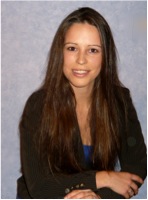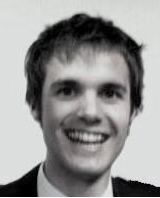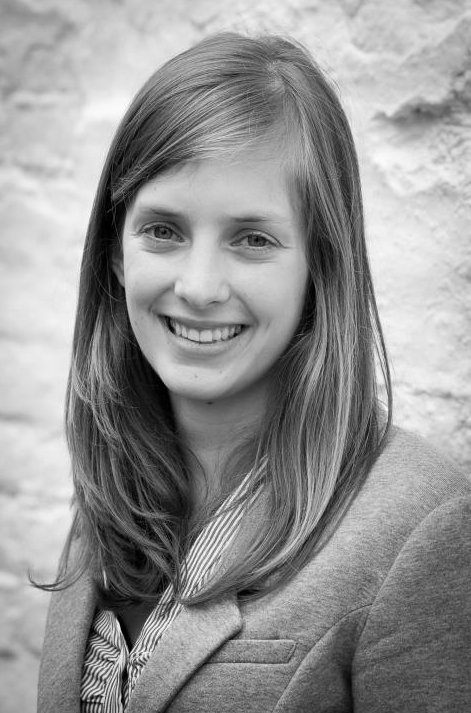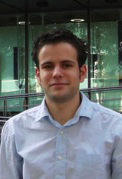Testimonials by Data Analytics Graduates
We are very proud of how well our "Data Analytics" graduates are doing. This program has been renamed from Marketing Engineering. Its content has been adapted to reflect the new orientation. Below, you find some testimonials:
Bart Van Der Vurst - ME Graduate Class of 2013
Management Consultant - McKinsey & Co. - Brussels, Belgium
A master should fit with your personal interests and ambitions, reflecting your appetite to zoom in into one or more topic area's seen in the bachelor program. My interest into ICT and statistical related courses combined with my ambition to learn about this Big Data trend motivated my choice to go for Marketing Engineering.
In today's world, more than 2.5 exabytes of data is gathered every day. Data on which, up till now, many companies have failed to act upon. This is where the courses of Marketing Engineering react upon by solving the essential question 'how analytical tools can improve our decision process in relation to (marketing) optimization problems'. Practically, the courses focus on jointly solving questions like 'can we predict which client is most likely to end his subscription' or 'which contact approach fits best to which client segment'. Towards all these questions, the master has taught me to first collect the necessary data, second run it through the right optimization algorithms and finally translate it into a clear management decision. For me personally, this end-to-end learning path was the most value adding.
In my job as a management consultant, I had the opportunity to directly apply my analytical skills in top tier companies across Europe. The specific methods learned within Marketing Engineering, proved really value adding for our clients, clarifying the practical relevance of this master program.
Finally, I'm convinced that Marketing Engineering reflects one of the distinctive area's within our faculty. Next to a hands-on introduction into predictive and optimization modeling, the master allows you to graduate with knowledge and case experience in worlds most important Big Data tools (i.e. SAS, R, SQL, etc.). Distinguishing skills on your resume as noticed by me and my class peers.
Good luck & enjoy!
Matthijs Meire - ME Graduate Class of 2012
Consultant - Mobius - Sint-Martens-Latem, Belgium

My choice for Marketing Engineering originated from talks with former students. Some of them said the other majors contained more duplication and not that much extra information, and I really wanted to explore new themes and that is why I chose Marketing Engineering. It offers an insight into marketing that is not well known but very important, as many companies suffer the lack of capabilities to efficiently and effectively analyze large piles of data. The Marketing Engineering major further reveals more insights into statistics and statistical programs, into modeling languages and modeling techniques in general. These prove to be useful even now, in the beginning of my career as a consultant. Deep insights into statistics are useful in every business context, and this major was a good help.
For me personally, the optimization part was most interesting. We saw how we could really implement heuristics, saw some algorithms, had to find and implement some on our own, ... In this way, the theory is put more into perspective in a real-life case study. This optimization part is very valuable in situations different from marketing as well, such as operations management. On top of this, the tools we saw used powerful languages. Instead of bungling with Excel, we learned to program a neat solution to the problem. And, although you might never use the specific programming language itself anymore, the method of programming and thinking can be applied when using other programs.
As a conclusion, I could say that the Marketing Engineering major has fulfilled my need and hunger to both theoretical and practical knowledge, which will prove useful in my working career.
Elke Potums - ME Graduate Class of 2011
Analytical Consultant - SAS Institute - Tervuren, Belgium

For me the choice to follow the Master in Marketing Engineering major was an easy and obvious one, because this was the only major that could satisfy my statistical appetite and that focused on the use of data and IT to solve business problems.
Although expectations were high I didn't get disappointed. The Marketing Engineering elective part provided me with a sound mix of theoretical and practical insights into data mining, predictive modeling, optimization and market research, illustrated with real business cases. The latter is a major asset of the program: You learn to apply different modeling techniques and programming languages in order to tackle diverse business problems, and not just because they're fun to use. As such, you will not only improve your technical skills but you will also obtain a broader business understanding.
Besides the practice-oriented approach of this major there is also another advantage: All the modeling techniques you learn are not only applicable in a marketing environment, but they can be easily adapted to other analytical environments. Today, I work as an analytical consultant for SAS Institute, where I'm faced with all kinds of business challenges of different companies within different sectors (e.g. credit scoring, operational forecasts, fraud detection). The modeling basis acquired during the Marketing Engineering option was certainly a good basis to start from and I'm certain that it wouldn't be easy to do my job if I had chosen another major. Therefore, I'm thankful to all the staff of the marketing department who have taught me the different concepts and who were always helpful whenever I had a question.
Michiel Van Herwegen - ME Graduate Class of 2011
BI Consultant - Business & Decision - Sint-Lambrechts-Woluwe, Belgium
When I had to choose a master, Marketing Engineering seemed the Business Engineering+ option:
- It was a business engineering master
- It had no courses named 'XYZ Management'
- It seemed as a good way to gain in-depth knowledge instead of breadth.

My two master years turned out to be Business Engineering++, for several reasons. First of all, the master has an interesting duality between a more classic approach to market research where you handle analysis of questionnaires using tools like SPSS. I would call that Van Kenhove marketing. On the other hand, you have the analytical CRM approach, where the amounts of data are huge and the tools of trade are mostly developing environments. To me, this is Van den Poel marketing. Both sides together prepare you well for analytical thinking on any scale.
Where the content of a master is important, the style is critical. And with hindsight, this is where Marketing Engineering really made the difference with the other options, no matter your appetite for number crunching. All the courses adhere to a very hands-on approach, using actual data, actual cases. Half the time, you're busy putting the theory into practice. Speaking of theory: no time is wasted on what has no practical value. If you have theory before the break, it's nearly impossible that you won't be already trying it out 15 minutes later. In addition, the interaction during courses, feedback or just when an opportunity presents itself... it all comes naturally.
By the time I jumped into the labor market, Marketing Engineering provided me with several trump cards: the employers looking out for analytical backgrounds are numerous, the many tools (especially SAS and Oracle) used during the master are very likely to be waiting for you at any multinational. And due to the practical nature of the master, your first encounters with real-world will be kinder on you.
Daan Raemdonck - ME Graduate Class of 2011
Associate Consultant - Bain & Company - Brussels, Belgium

I believe there to be - at least - three good reasons for students to choose the Marketing Engineering major: First of all, it delivers a broad insight into how large information sources can be leveraged by companies in today's world. Next, it allows the student to develop strong analytical skills. Lastly, the addition of marketing research courses and the discussions on advanced topics in marketing allow for a training that covers almost all parts of the marketing spectrum.
Due to the fact that data storage has become incredibly cheap this last decade, a lot of companies are investing in data gathering in their day-to-day business. However, a lot of them struggle with using and leveraging this massive source of information. This is exactly where the courses taught in marketing engineering come in. You will discover the many ways possible to tackle the information overflow problem, and will soon be able to distil meaningful concepts and trends from what is a seemingly endless supply of data. There is no way around it; here lies the future of marketing.
As a consequence of the topics you will cover, you will soon develop an analytical way of approaching things. Deconstructing large problems into smaller parts to make them understandable is a skill that is priceless to have. In almost any job setting and in your daily life, your analytical background will allow you to do things others cannot.
Finally, it is important to know that next to the heavy, analytical courses within this major, there are also more soft courses revolving around brand marketing in general and marketing research. These courses will allow you to delve deeper into the creation and upholding of a brand. Next to that you will discover advanced models used daily to analyse consumer behaviour and opinions. Added to the previously mentioned skills this makes for a complete formation in the marketing field, with an analytical touch.
To conclude, you should choose marketing engineering if you want to be able to deal with large data sources and want to be able to transform useless data into priceless insights. If you do, you will undoubtedly develop a strong sense for analytical thinking, a skill that will prove valuable throughout your entire life. Lastly, this major covers more than just data: you will gain insight in brand creation and management, and will use advanced market research models to analyze consumer behavior. Combined, I am more than confident that this major builds a very solid foundation to work in the future marketing environment.
Rosemarijn Dumont - ME Graduate Class of 2011
Marketing Analyst - The House of Marketing - Mechelen, Belgium

People always react surprised when I tell them I obtained a Master of Science in Marketing Engineering. This at first sight unusual combination of the soft skills that are associated with marketing and the somewhat harder skills associated with engineering is a great preparation to pursue a job at the marketing department. The market is evolving, the amount of available data is increasing rapidly and companies are facing huge challenges how to use that data in their decision making. This master offers a set of courses that perfectly match these trends. It provides the students with a solid analytical background and stresses the importance of translating analysis into executable actions. Taking into account these trends, I'm really happy with the choice I made and I'm pretty sure Marketing Engineers will be essential for a company in the future.
Dennis Verhaert - ME Graduate Class of 2009
Customer Insight Analyst - Dunnhumby Ltd. - London, UK

After obtaining a bachelor degree in Business Engineering, choosing a suitable master wasn't easy. I ultimately decided to follow the Marketing Engineering program because of its appealing mix of both IT and business courses. In contrast with a lot of courses of the bachelor program, there was always a strong emphasis on applying the theory into practice. All skills developed in the master are relevant in a business context. The techniques and knowledge gathered during the master provide excellent baggage to apply for a variety of positions in the marketing industry. I now work for dunnhumby as a customer insight analyst in London. A lot of Master of Marketing Analysis graduates joined dunnhumby over the last couple of years. Therefore, obtaining the related Master in Marketing Engineering was essential in order to get hired. Looking back, I am very happy with my decision to follow this master. More and more companies are putting data at the core of their marketing decisions. Therefore, the quantitative marketing industry is a fast growing industry that is still changing very quickly, which makes it exciting to work in.
Similar testimonials of graduates of our Master of Marketing Analysis can be found here
